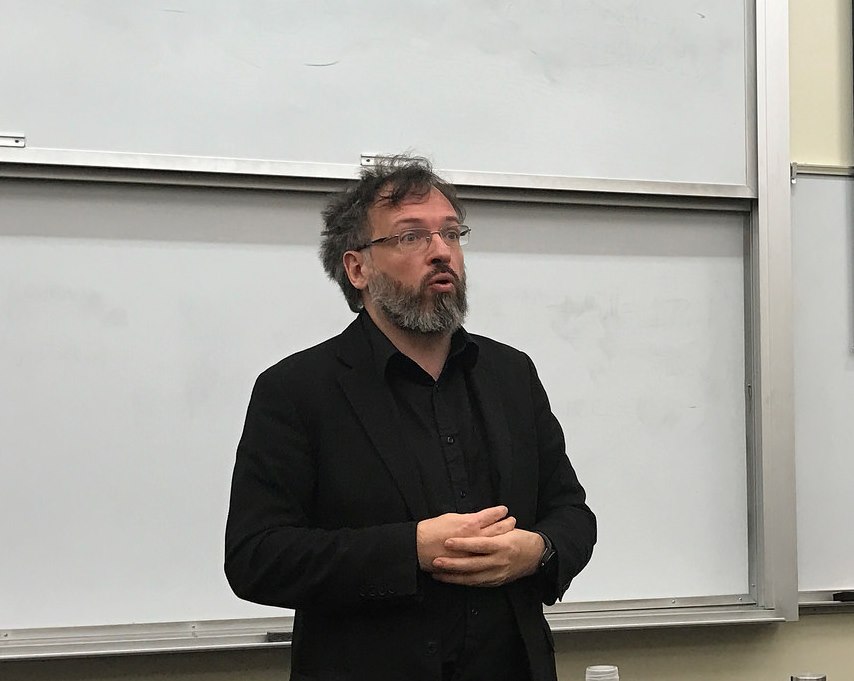
Danny O’Brien’s recent talk at Santa Clara University
Maria Sokova is a second-year student at Santa Clara University’s School of Law, where she serves as External Vice President of the Privacy Law Student Organization (PLSO).
Concerns over global surveillance and the intersection of human rights and privacy have been gaining public interest over the years. On March 2, 2017, Danny O’Brien, the international director of the Electronic Frontier Foundation (EFF), addressed those concerns in his talk at Santa Clara University’s School of Law, co-sponsored by the Ethics Center.
The Electronic Frontier Foundation was founded in 1990 to protect user privacy, promote the use of encryption, defend technology users, and assist with implementing a shift into the digital age. The organization defended technologists who were targeted by law enforcement due to misunderstandings regarding technology. O’Brien explained that, in the process, the government conducted raids that included the seizure of servers, and, along with them, the communications of hundreds of people.
O’Brien also mentioned the EFF’s work promoting the use of encryption for more than just credit card numbers or passwords. He explained that the lack of encryption and the early mass-seizures of servers and data led to the law enforcement and government intelligence communities having nearly unrestricted access to a variety of data – your location, who you’re talking to, even the content of your communications. Through the work of the EFF and support in Silicon Valley, however, end-user traffic encryption has now increased to over 50%. While this number shows significant improvement, O’Brien cautioned that the system of mass surveillance by law enforcement and government intelligence agencies has a very strong foothold and is still difficult to fight against.
Today, intelligence gathering and surveillance are part of our everyday lives and touch every single person who uses a digital device. O’Brien argued that the sheer amount of data collected is actually detrimental to its effective use. O’Brien compared data searches for a potential terrorist to having “a haystack full of needles” to sift through. The issue is no longer whether you will find a suspect, but that someone is inevitably going to be a suspect once you put your targeted data search parameters in place.
O’Brien wove this discussion into the Trump administration’s focus on specific immigration demographics. He stated that with this approach you will always find crimes in a chosen demographic, but the analysis changes when the data is compared to that of the broader population. He cautioned that intelligence agencies are beginning to look at certain facts or data only from a specific angle and under a limited spectrum of light, rather than looking at all of the facts, as the judicial system does. And he raised the human rights issues that emerge when privacy is denied to certain populations and when the rights of non-citizens are cut off.
O’Brien also addressed what happened in the period following the November election. He focused on how different classes of people may now receive different levels of protection under the Bill of Rights. He mentioned this problem specifically in the context of people currently being forced to give up their passwords, phones, and social media accounts to Homeland Security upon arrival to the United States. While some of these practices had been proposed previously, they had never received the “go-ahead” from the prior administration.
In the end, O’Brien offered a somewhat positive note. He mentioned that it is a little too early to tell what will happen under the new administration; however, he noted President Trump’s already uneasy relationship with the intelligence community. He stated that the onus will be on Congress to decide whether it will be reigning in the administration or aligning itself politically with it. Change will be made by everyone understanding that we are now in a new environment, and through legal challenges and activism by the EFF and other similar organizations. A combination of a reliance on traditions and non-violent actions will be needed to bring awareness and reform to surveillance practices, and to protect the rights of both citizens and non-citizens. O’Brien concluded his talk by pointing out that the international community is keeping an interested eye on the way in which the United States will face these challenges and move forward.
This event was part of the Social Justice and Technology Speaker Series hosted by the Santa Clara University School of Law’s Center for Social Justice and Public Service, the Markkula Center for Applied Ethics, the High Tech Law Institute, and the American Constitution Society for Law and Policy.
Photo by Eric Goldman
